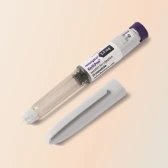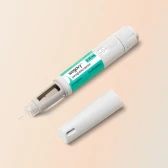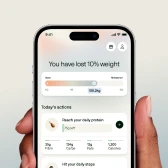Is there a way to lose weight on your face? It’s something we’re asked a lot here at Voy. And we get it: your face plays a big role in how you see yourself. It can be disheartening not to notice any changes after all your hard work reaching for your health goals.
But we want to remind you that there’s nothing inherently wrong with having a fuller face—the social pressure to look a certain way is based on trends, not facts. Besides, how your face looks is influenced by more than just your weight.
That said, if you are feeling self-conscious about it, you might be wondering if there’s anything that can help. Here’s what you need to know.
Understanding facial fat: causes and considerations
There are a bunch of things that can influence how full your face looks. Your genes play a role in how fat is distributed across your body, as does your current health and medical history and your lifestyle choices.
For example, eating too much salt can cause your body to retain water, which might make your face look puffy.
Again, having a full face is not a ‘bad’ thing. In fact, facial fat provides your skin with structure and volume to make it look plump—which might actually give you a more youthful appearance.
Lifestyle changes to reduce facial fat
Here’s the thing: you can’t control which parts of your body will slim down first when you lose weight.
So, how can you lose weight in your face? Though it might not happen right away, losing weight overall will generally lead to a reduction in face fat. There’s research showing that a 1.33 reduction in BMI is enough to cause noticeable facial changes when losing weight.
A healthy and balanced diet (porridge, anyone?) plus regular exercise is your ticket to sustainable weight loss. Weight loss medicines can be a great help here as part of a long-term programme, too. If you can build habits that last, you can reach your goals and keep the weight off.
It’s also a good idea to keep an eye on your stress levels. Not only can chronic stress trigger cravings for unhealthy comfort foods, it can mess with your sleep— which is also linked to weight gain.
Managing facial puffiness
A poor night’s sleep, not drinking enough water, and having too much alcohol or salt can all cause fluid to build up in the tissues of your face—which might make it look bloated or puffy.
In these cases, the puffiness will usually die down once you stop doing the thing that’s causing it. Though sometimes, a swollen face is a sign of an allergic reaction. If the onset of facial swelling is very rapid and/or is associated with a skin rash and/or difficulty breathing, reach out to the emergency services asap.
Do facial exercises work?
There’s been a bit of hype around facial exercises, or ‘facial workouts’, as a way to tighten the appearance of the face and neck. For example, ‘jaw workout’ devices can include silicone balls that you bite down on, which supposedly helps to strengthen your jaw muscles.
But there’s super limited evidence around these sorts of ‘workouts’. While they *might* tone your muscles, there’s no strong data to suggest that they have any impact on facial fat. In fact, there’s studies showing that they have no impact on facial contours.
What about buccal fat removal?
A few years ago, this procedure made headlines thanks to its popularity among celebrities. It’s when part or all of the buccal fat pads—which sit in the cheeks, below the cheekbones—are removed, giving the face a more defined look.
But like all surgical procedures, it comes with risks. And if too much is removed it might make you appear hollowed out or gaunt. So, you should think carefully about whether this is right for you.
It’s also worth considering potential future changes in your facial features that might come with aging. As we age, our facial fat gradually decreases.
Weight loss medications and facial fat
Have you heard of “Ozempic face”? It’s a term for the changes in facial appearance some people experience while using weight loss medications. Usually, it refers to having looser skin around the jawline or sunken cheeks.
It’s true that your skin can become looser when you lose a lot of weight—including around your face. But that won’t necessarily happen to everyone who uses weight loss medicines.
Yet there is solid scientific evidence that when used alongside healthy lifestyle changes, these medicines can lead to cumulative, sustained weight loss over the course of at least a year. For example, you might lose a few percentage points of your initial weight each month when you start on Mounjaro injections.
Weight loss medicines are designed to improve your overall health rather than specifically slim your face (though they might influence this indirectly). So you should only take them if your doctor says they’re suitable for you.
Dealing with negative thoughts about your appearance or weight gain
If you’re someone who struggles with body image—we see you, and you aren’t alone. The social pressures around beauty standards can feel relentless, like you aren’t good enough as you are.
But we’re here to remind you that you are more than good enough. And that your weight loss journey is about health, not hitting some arbitrary target for how ‘skinny’ you’re supposed to look.
That said, we know it’s not easy to just ignore these pressures. If negative thoughts are affecting you, there are things that might help.
Practising acceptance can help you treat yourself with more compassion, for example. Exercising more or going to therapy have also been shown to promote positive body image. Your provider may be able to suggest other options that are better suited to you personally.
Your path to sustainable weight loss
Having good health is way more important than how you look—and, to reiterate, there is absolutely nothing wrong with having a fuller face.
Though if you are wanting to lose weight and reach your health goals, weight loss medications could be a great option. They’re especially suited to people who have tried to lose weight another way but didn’t get the results they hoped for.
As part of our weight loss programme, you’ll get weekly medication plus one-to-one support from our team of expert coaches. Find out if you’re eligible by filling out this short form. One of our clinicians will get straight back to you.












